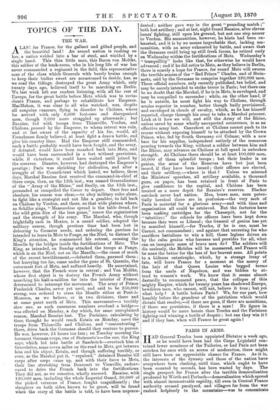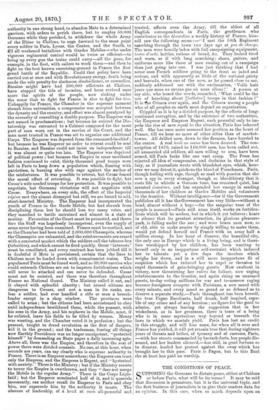PARIS IN ARMS. H AD General Trochu been appointed Dictator a
week ago, as he would have been had the Corps Legislatif con- tained fewer nominees of the Tuileries, or had Paris not been stricken for once with an access of moderation, there might still have been an appreciable chance for France. As it is, the interests of the dynasty and those of the nation have everywhere been clashing, until time, which ought to have been counted by seconds, has been wasted by days. The single prospect for France after the terrible demoralization produced by Worth and Forbach—demoralization which spread with almost inconceivable rapidity, till even in Central France authority seemed paralyzed, and villagers far from the war rushed helplessly to the mountains—was to concentrate
authority in one strong hand, to abandon Metz to a determined garrison, with orders to perish there, but to employ 50,000 Germans while they perished, to withdraw the whole Army of the Rhine to Chalons, to urge forward to the same point every soldier in Paris, Lyons, the Centre, and the South, to fill all weakened battalions with Gardes Mobiles—who under vigorous regimental control would be twice as efficient—to bring up every gun the trains could carry—all the guns, for example, in the fleet, with sailors to work them—and then to fight on the best known exercising-ground in France the first grand battle of the Republic. Could that policy have been carried out at once and with Revolutionary energy, death being made the sole penalty for slackness, disobedience, or cowardice, Bazaine might have had 300,000 efficients at Chalons, have stopped the tide of invasion, and have revived once more the spirits of the people, now sinking under the sense that to fight for France is also to fight for hint. Unhappily for France, the Chamber in the supreme moment shrank from extremities, a compromise was accepted between the dynasty and the country, and effort was almost paralyzed by the necessity of consulting a double purpose. The Emperor was not named in proclamations ; but because he existed the Dic- tatorship was entrusted to a Cabinet composed for the most part of men worn out in the service of the Court, and the man most trusted in France was set to organize one additional Corps. The Emperor was deposed from the command-in-chief ; but because he was Emperor no order to retreat could be sent to Bazaine, and Bazaine could not insist on independence till it was almost or quite too late. The Emperor was deprived of political power ; but because the Empire in some moribund fashion continued to exist, thirty thousand good troops were left in Paris to keep down a population which, flaming with patriotism, is burning also with rage against the author of the misfortunes. It was possible to retreat, but Caesar feared the moral effect of retreating. It was possible to fight, but Caesar's wife needed troops for her protection. It was possible to negotiate, but Germany victorious will not negotiate with Caesar. Everywhere, on every side, the effect of the Imperial regime met the almost dismayed but still, we are bound to add, stout-hearted Ministry. The Emperor had incorporated the youth of France in the Garde Mobile, but had shrunk from disciplining them lest he should lose too many votes, and they marched to battle untrained and almost in a state of mutiny. Favourites of the Court must be promoted, and there- fore the Staff was hopelessly incompetent, even the supply of arms never having been examined. France must be soothed, and so the Chamber had been told of 2,000,000 Chassepots, whereas the Chassepots are exhausted, and the reinforcements are armed with a converted musket which the soldiers call the tobacco-box (tabatiere), and which cannot be fired quickly. Great "interests" must be conciliated, and every contract has been jobbed till it is doubtful if Metz is provisioned, certain that the lines to Chalons must be loaded down with commissariat trains. The populace of Paris must be found work, and so 30,000 navvies who could entrench Chalons are set to improve fortifications which will never be attacked and can never be defended. Caesar must not be resisted, and there was therefore throughout France no National Guard. The Ministry called it out, and it obeyed with splendid alacrity ; but armed citizens are dangerous to Caesars, and not a man in its ranks, un- less a soldier, had ever handled a rifle or seen a breech- loader except in a shop window. The provinces were called to arms ; but the citizens had been accustomed to obey until independence bewildered them, while the peasant, with his sons in the Army, and his nephews in the Mobile, must, if he enlisted, leave his fields to be tilled by women. Money was wanting, and the Chamber voted it in profusion ; but the peasant, taught to dread revolution as the first of dangers, kid it in the ground ; and the tradesman, fearing all things now Earthly Providence was no longer omnipotent, "protected himself " by demanding on State paper a daily increasing agio. Above all, there was the Empire, and therefore in the seat of power there were divided counsels. No one, at this hour, when seconds are years, can say clearly who is supreme authority in France. There is an Emperor somewhere; the Emperor can trust only the Empress, and the Empress is Regent, and " hysterical with anxiety." There is the Ministry ; but if the Ministry resorts to terror the Empire is overthrown, and they " dare not merge the Mobile in the regular Army." There is the Corps Legis- latif ; but the Emperor nominated half of it, and it quarrels incessantly, can neither recall its Emperor to Paris and obey him, nor supersede him by the authority it trusts. The absence of leadership, of a head at once all-powerful and trusted, affects even the Army, till the ablest of all English correspondents in Paris, the gentleman who contributes to the Guardian a weekly history of France, him- self saw the following scene :—" I met the 58th Regiment marching through the town two days ago at pas de charge. The men were heavily laden with full campaigning equipment, tentes d'arbi, kettles, rations of bread, &c. They looked tired and worn, as if with long marching ; shoes, gaiters, and uniforms more like those of men coming out of a campaign than just going into one. I was just thinking that I had never seen French soldiers going to the front so jaded and serious, and with apparently so little of the national gaiety and bravado, when one of the men, as he passed close to me, suddenly addressed me with the exclamation, Voila limit jours que nous ne savons pas oil nous allons ! ' A person at my side, who heard the words, remarked, What could be the use of knocking about [ballotter] troops in that fashion ?" It is the Crimea over again, and the Crimea among a people who of all peoples on earth most depend on organization. Crippled as it is by a divided purpose, by the effects of long- continued corruption, and by the existence of two authorities, the Emperor and Empress Regent, each powerful only to im- pede the rise of men equal to the situation, Paris has behaved well. She has once more assumed her position as the heart of France, till we hear no more of other cities than of market- towns. All drilled men, down to the firemen, have hurried to the centre. A real levee en masse has been decreed. The con- scription of 1870, raised to 140,000 men, has been called out, all unmarried old soldiers, all men willing to arm, have been armed, till Paris looks like one vast camp. The Press has rejected all idea of compromise, and declaims in that style of fury, as if journalists wrote with bloodshot eyes, which, how- ever we may detest it, quickens the blood of Frenchmen. Paris, though boiling with rage, though so mad with passion that she sees a spy in every stranger, though so bloodthirsty that it costs life to whistle a German tune, has remained quiet, has arrested e'ineutiers, and has expended her energy in sending thousands of her children as Gardes Mobiles and volunteers to the frontier. Without intelligence—for if the Government publishes all it has the Government has very little—without a head, almost without a hope—for the sanguine tone of the people is assumed—Paris still arms itself, works on fortifica- tions which will be useless, but in which it yet believes ; hears in silence that its greatest attraction, its glorious pleasure- park, is falling under the axe ; and were brave men now, as of old, able to make armies by simply willing to make them, would yet defend herself and France with an army half a million strong. In her hour of disaster, the beautiful city, the only one in Europe which is a living being, and is there- fore worshipped by her children, has been wanting to herself only in an inopportune self-restraint which induced her to tolerate yet a few days the incubus which weighs her down, and in a still more inopportune fit of suspicion which has induced her to expel or threaten to expel thousands of gain-bringing guests. Now exultant in victory, now threatening her rulers for failure, now urging reinforcements to the frontier, and again rising on unarmed guests, to-day voting millions for war and to-morrow raging because foreigners compete with Parisians, a new mood with every minute, and every mood so grand or so debased as to deserve a separate study,—Paris throughout has been herself, the true Pagan Bacchante, half drunk, half inspired, capa- ble of any crime and of any heroism ; no figure for the good to admire, yet always leaving the suggestion that in her wickedness, as in her greatness, there is trace of a being who is in some mysterious way beyond or beneath the laws to which we mortals yield. Paris has lost no credit in this struggle, and will lose none, for when all is over and France has yielded, it will yet remain true that during eighteen years of threats and bribes, of tyranny and of caresses, Paris, —with her streets commanded by barrack-forts, her people dis- armed, and her leaders silenced,—bas still, in good fortune as in disaster, hurled her protest against the sway which has brought her to this pass. Paris is Pagan, but to this Baal she at least has paid no worship.































 Previous page
Previous page